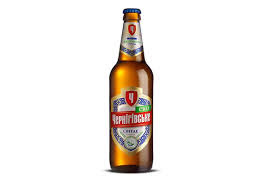Oh well, back to vodka.
Bottle pictured is Chernigivske, AB-Inbev's best selling beer in Russia and Ukraine. JL
Saabira Chaudhuri and Georgi Kantchev report in the Wall Street Journal:
The world’s biggest brewer is pulling out of Russia. Anheuser-Busch InBev SA said it would sell its stake in its large Russian beer joint venture, booking a $1.1 billion impairment charge. That follows moves by its biggest rivals, Heineken and Carlsberg , which operate independently in Russia, and said weeks ago that they would pull out. Russia was for years one of the world’s fastest-growing beer markets, but has been a tough environment since Moscow moved to curb drinking by raising taxes and limiting salesThe world’s biggest brewer is pulling out of Russia, exiting a key beer market, as Moscow’s invasion of Ukraine drags on and multinational companies weigh up their options.
Anheuser-Busch InBev SA said it would sell its stake in its large Russian beer joint venture, booking a $1.1 billion impairment charge. That follows moves by its biggest rivals, Heineken HEINY 1.10% ▲ NV and Carlsberg CABGY -1.20% ▼ A/S, which operate independently in Russia, and said weeks ago that they would pull out.
AB InBev BUD -3.47% ▼ operates in Russia through a non-controlling stake in a joint venture run by Turkish drinks maker Anadolu Efes. The Budweiser maker said Friday it was in discussions to sell its stake to Anadolu Efes.
Carlsberg said Thursday it would take a $1.39 billion write-down tied to its decision to leave Russia. Heineken has said it expects to take a $432 million charge tied to its move to leave.
Two months into Russia’s invasion of Ukraine, companies who haven’t already pulled out of the country are evaluating their continued presence—based on considerations they say are moral, logistical or based on safety concerns.
AB InBev’s move comes amid intense pressure on big companies from Ukraine’s government, Western countries, investors and consumers to pull out of Russia. A raft of financial sanctions and export controls slapped on Russia by Washington and its allies has made doing routine business in the country difficult, if not impossible, for many companies. Making international payments, importing raw materials and paying staff have all been complicated by the new restrictions.
More than 750 Western companies have said they will exit or cut back operations in Russia, according to researchers at Yale University.
Some companies, like AB InBev, initially took a more wait-and-see approach. It previously said it had asked its Turkish partner to suspend the license for Budweiser in Russia and would forfeit all profits from the joint venture. On Friday, it said that request would form part of any agreement between the two companies.
Moscow, meanwhile, has been pressuring companies to restart operations. Earlier this week, German auto-parts supplier Continental AG, which in March suspended production at its Russia plant, said it was temporarily resuming tire production for passenger cars. It said local employees faced the prospect of “severe criminal penalties” if it failed to meet local demand.
Representatives for the Russian prosecutor general’s office weren’t immediately available to comment on any such penalties. The office had previously said it would step up scrutiny of Western companies who have said they are pulling out, to ensure enforcement of Russian labor laws.
There are several pieces of legislation that are making their way through the Russian Duma that could make it much harder for companies to take a middle path. One measure would allow for the nationalization of assets left idle by Western companies. Another is aimed at criminalizing complicity with Western sanctions. How either piece of proposed legislation would affect companies is unclear.
On Thursday, Russia’s deputy trade minister said that both IKEA and Zara owner Industria de Diseño Textil SA were seeking to reopen their Russian stores after adjusting their supply chains, according to state media agency TASS. Viktor Evtukhov said that foreign companies who have suspended their activities cite logistical problems rather than the situation in Ukraine, according to TASS.
Neither IKEA nor Inditex would comment directly about Mr. Evtukhov’s statements. An IKEA spokeswoman said the company’s decision to temporarily pause operations in Russia was still valid. An Inditex spokesman said the company had also paused its operations only temporarily and had previously said it would resume operations as soon as circumstances allow.
AB InBev has been a major player in Russia’s beer market since 1999, when its predecessor, Interbrew, formed a joint venture with Sun Brewing, becoming the No. 2 brewer there and the No. 1 in Ukraine.
After its blockbuster 2016 acquisition of SABMiller, AB InBev inherited SAB’s 24% stake in Anadolu Efes and in 2018 struck a 50-50 joint venture to merge its Russia business with that of the Turkish brewer. AB InBev treated that business as an equity stake, while Anadolu Efes consolidated it fully into its accounts.
Russia was for years one of the world’s fastest-growing beer markets, but has been a tough environment since the global financial crisis. Moscow moved to curb drinking by raising taxes and limiting sales, and the economy was also hit by sanctions and lower oil prices. By 2019, Russia made up 4% of global beer volumes, with consumption at around two-thirds of what it was a decade earlier. Nonetheless, the country has remained of interest, as its relatively low per capita consumption compared with North America and Western Europe leaves a long runway for growth.




















0 comments:
Post a Comment